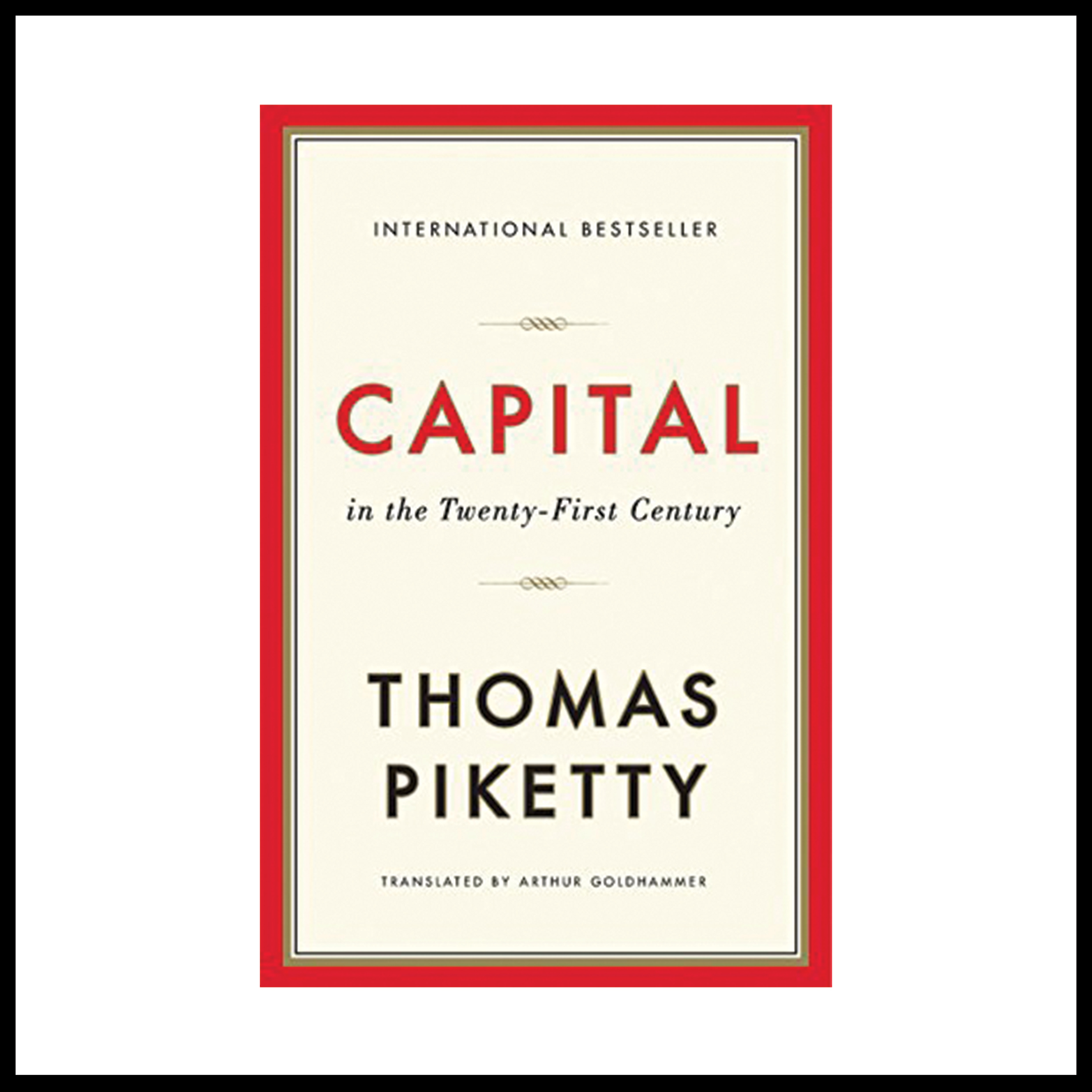Gordon Lafer dives into the shallow end of the genetic pool, in order to observe Homo Economicus up close, and better explain the downward mobility of corporate economics.
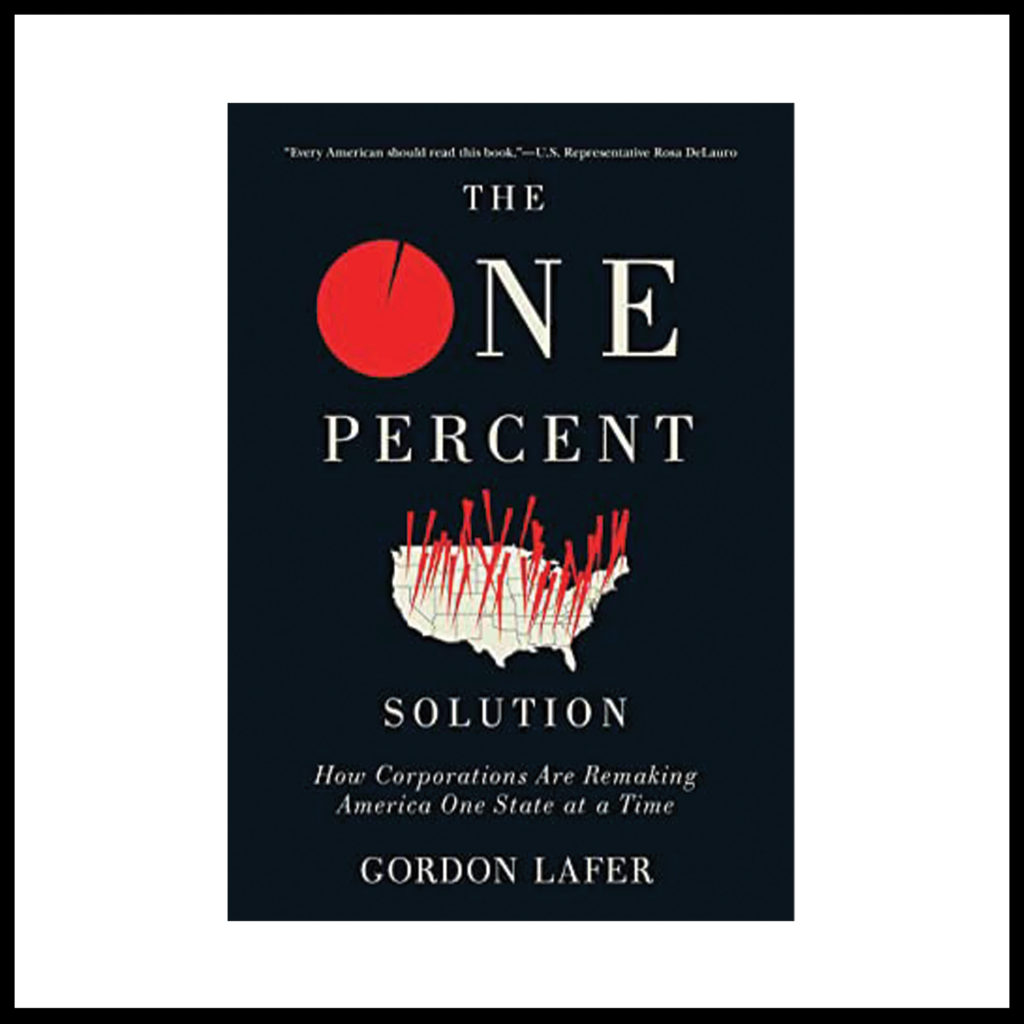
The One Percent Solution (2017)
- By Gordon Lafer
- Amazon Rating: 5.0
- 272 Pages
- Kindle: $9.99
- Hardcover: $20.99
Product details
- ASIN : 1501703064
- Publisher : ILR Press; 1st edition (April 4, 2017)
- Language : English
- Hardcover : 272 pages
- ISBN-10 : 9781501703065
- ISBN-13 : 978-1501703065
- Reading age : 18 years and up
- Item Weight : 0.988 ounces
- Dimensions : 6 x 1 x 9 inches
- Best Sellers Rank: #620,322 in Books (See Top 100 in Books)
- #100 in Province & Local Canadian History
- #265 in Corporate Governance
- #358 in United States Local Government
About The Author:
Political economist Gordon Lafer is currently an Associate Professor at the University of Oregon’s Labor Education and Research Center, but he did do a stint in government, as the Senior Policy Advisor for the U.S. House of Representatives’ Committee on Education and Labor.
Lafer started out as an economic policy analyst in the office of New York City mayor Ed Koch. Even while earning his PhD at Yale, Lafer was active in supporting unions, and calling out the “corporatization of higher education”. Soon he began advising various worker’s organizations, including a union of “hotel workers in Hawaii, construction workers in Las Vegas, supermarket workers in California, and nurses in Oregon”.
He still remains a research associate at the Economic Policy Institute, a non-partisan think tank trying to speak for the lower- and middle-class worker in manners of economic policy. They do not ask for much: fair pay, affordable health care, and retirement security. This is where we are in America currently: slipping precariously backwards. As Lafer points out in the Once Percent Solution, we are actually getting pushed backwards by corporate agendas seeking to “normalize downward mobility”.
About the Book:
“The corporate lobbies have pursued an agenda that steadily shrinks public services, including education, health care, libraries, recreation, parks, and transportation. This agenda serves to lower corporate tax bills and creates new markets for those hoping to profit from the privatization of public services.”
In trying to understand the U.S. corporate agenda, Lafer “proceeds on the premise that corporations ultimately behave rationally.” He then presents evidence that often seems to prove the exact opposite. By holding to his original premise of ‘rational behavior’ as the ‘Constant’, however, Lafer is able to draw more insightful conclusions about the flaws in both our economic strategy and the one percent of us in charge of forming and implementing that strategy.
The Koch brothers, for instance, (of Koch Industries and Error! Hyperlink reference not valid. notoriety) are consistently opposed to ‘bigger’ government – at least for the ‘smaller’ people; meanwhile, they take “maximum advantage of federal subsidies for their oil and pipeline businesses – even engaging lobbyists to ensure these perks stayed in the federal budget”. Outwardly, the Koch’s “oppose Iran’s form of government, but nevertheless employed a foreign subsidiary to sell oil equipment to the country in disregard of U.S. sanctions”. They have been sued for stealing oil from Native American lands, and voted against “unwarranted government intrusion in the market” up until the 2008 financial crisis, when their own financial interests were threatened. At that point, “within 48 hours, the Koch’s had switched sides, and [Americans for Prosperity] signed on to a letter urging U.S. senators to support TARP [the bank bailout bill]”.

Homo Economicus, the fictitious human being upon which many corporate economic models are based, purports to be “a rational person who pursues wealth for his own self-interest”. While this may perfectly describe the lions, hyenas and vultures of the animal kingdom, 99% of animals also act out of interests like Belongingness, Cooperation, Fairness, Loyalty, and the like. So perplexed are Capitalists about these “grass-eater” types that they hire ‘behavioral economists’, in order to help explain them. Behavioral Economists (not to be confused with Behaviorists) conclude that “humans tend to be irrational in their decision-making”, and thus recommend factoring irrational behavior into all economic models.
Apparently, many economists are ‘rational’ in the same way corporations are ‘rational’.
What makes Lafer’s book so incisive is that it takes the Homo Economicus prototype, originally meant to explain the 99%, and flips it around, to better understand the one percent who created this prototype, and subsequently projected their shallow view of the world onto the rest of us. The model upon which the prototype is based has been designed to reward this kind of base-brain thinking, and in doing so actually punishes those who would stubbornly hold onto their moral integrity. The model is so caustic, it will ultimately end up undoing even the one percent, and the planet along with it, if it is allowed to continue on its suicide run.
This is because Money, originally conceived as a measure of economic value in some utopian ‘free’ market, has been re-purposed as the new weapon of political Control.
Witness the world of U.S. politics, also filled with plenty of ‘rational self-interest’. Corporate money has successfully stalemated the Congress, rendering Democracy ineffective. Meanwhile, corporate Globalism is out pounding the international pavement in search of profit. Corporations are Dictatorships, not Democracies, so it is only rational that dictators would want to do business with other dictators, especially those who have firm control of their 99%, in order to extract the country’s natural resources and cheap labor at the lowest possible prices. The fact that we have put many such foreign dictators in power, using anything from election interference to outright military intervention, rationally leads to conclude who is really in charge of United States, Inc. On those occasions when the U.S. accidentally inspires Democracy in some part of the world, we personally have used our physical and political influence to squelch it. Democracy is just a ‘front’ for our global Money laundering business.
One of the other fountains of economic rational self-interest is our U.S. Chamber of Commerce. “The health insurance industry provided more than $100 million to the Chamber to advocate against health care reform. All three of the world’s leading emitters of greenhouse gases – Chevron, ExxonMobil, and BP – are affiliated with the Chamber. The Chamber has also received significant funding from tobacco companies and is engaged in an international effort to defeat anti-smoking laws”. ‘People smoking is good for the health care industry’ – this is a rational argument for capitalists to make – thus adding addictive nicotine to tobacco becomes a win / win for tobacco and health care. The 99% might argue that ‘smoking kills people, we should let people know’ – this is a rational argument for humanists to make – thus taxing or suing the tobacco industry becomes a rational strategy to curb smoking tobacco. Libertarians would probably say ‘people have the right to smoke’, and then simply let them die if they cannot afford the health care. One has to admit, this is also a rational position.
Somewhere well-beyond the reasoning capability of Homo Economicus is the fact that people drink and smoke because of the hopeless feelings brought on by the oppression of Capitalism; as they “try to kill it all away”, poor health outcomes arise, profitable only to Homo Economicus, but not to actual people. Because Homo Economicus is incapable of comprehending the entire person, a new prototype must be created. It’s time for Homo Economicus to evolve, like the rest of us.
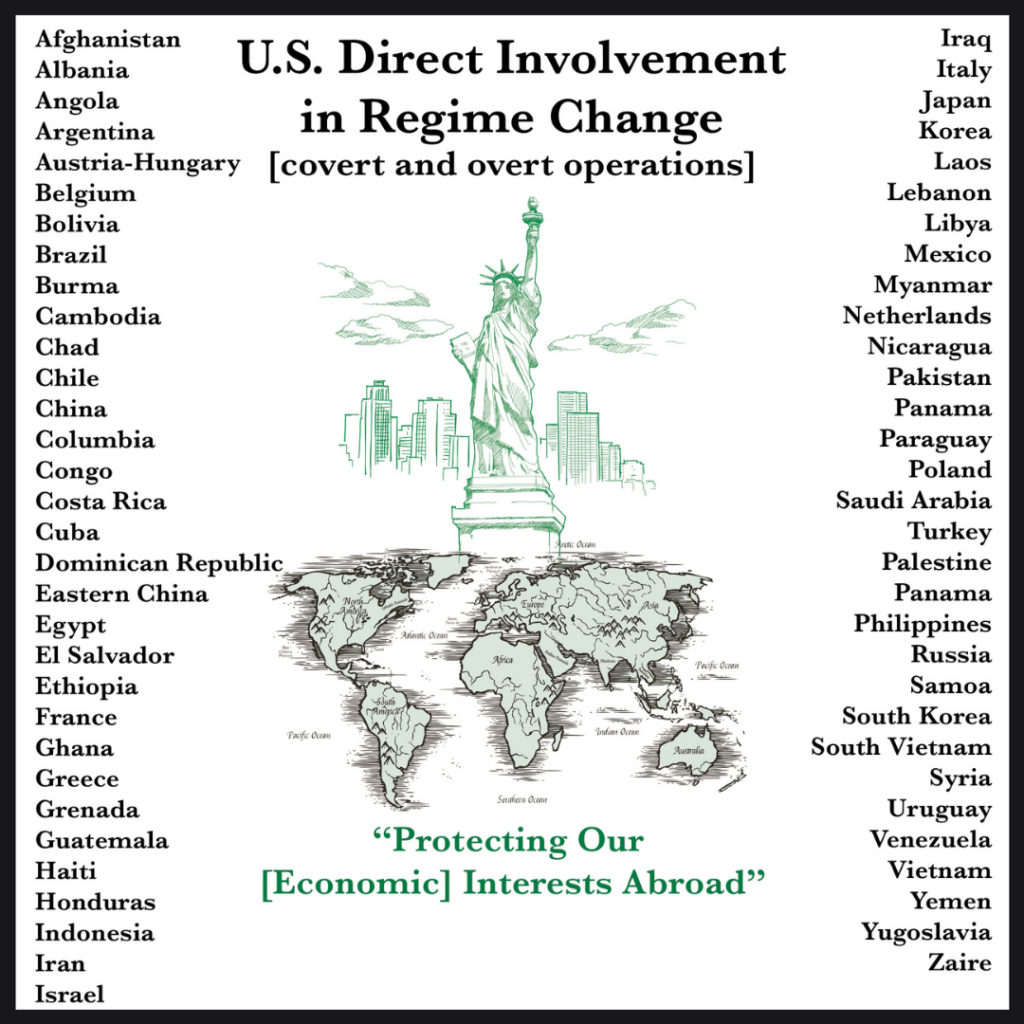
For those afraid to step out of the comfort of their economic cave, here is more incentive. In a world made of rational self-interest, one cannot climb to the top of the corporate ladder without it; unfortunately, greed appears to be a road with no off-ramp. American companies – like GM, “ExxonMobil, Caterpillar, Procter & Gamble, Pfizer, Dow Chemical, and IBM all [now] earn more than 60% of their revenue outside the United States” – and thus would rationally feel less beholden to Americans, in many cases shipping “at least one thousand American jobs overseas, overwhelmingly motived by cheaper labor abroad.” Concurrently, “a series of legal and regulatory changes” in the financial sector forced a shift in “corporate priorities”; now companies must “reorient their operations in order to maximize short-term return to shareholders.”
This road to short-term profits may have been paved with ‘good’ – aka economically rational – intentions, but it’s a road with no turns, and reversing course will result in severe tire damage. With this, Lafer concludes that “Corporate behavior is a product not of executives’ moral failings but of the legal and market structures within which they operate.” Between the rash of “hostile takeovers and leveraged buyouts” that come from swimming with sharks, “if companies sacrificed near-term returns for shareholders in favor of long-term social investment, they would soon lose capital and disappear. No amount of moral suasion can change this.” If one is to be a true ‘humanist’, one cannot ignore that even the one percent is trapped – forced to play the role of Judas in this economic passion play. For this reason, we are also tasked, as good Samaritans, with rescuing corporations from themselves; they are also a victim of their circumstances, a criminal that ‘deep down’ is likely begging to get caught; anything to get life-flighted off this runaway train before the track runs out.
If we ever decide to be ‘citizens united’, the first order of business must be to dig in our heels and stop this train. As Lafer succinctly explains (in a short YouTube video), top corporations are slowly remaking America in their image. They routinely meet and collectively decide state laws through The American Legislative Exchange Council (ALEC). Together, Corporations fashion bills, then send their hired lobbyists through the side door of Congress to push this economic agenda. Corporations found that buying votes at the state level was much cheaper – with more guaranteed results – than changing laws and regulations at the national level (although many of these bills are now showing up on the floor of Congress as well).
The main corporate agendas are:
- to chip government down as small as possible, while still retaining government corporate subsidies
- to dismantle all unions within the private sector, and silence their political voice as well.
- to get rid of public education. Education breeds democracy, which raises – not lowers – people’s expectation; the goal is to “normalize downward mobility”.
- to lower worker pay and benefits like health care and retirement security.
- to lower taxes on income, capital gains, inheritance et al.
Third Option Takeaways:
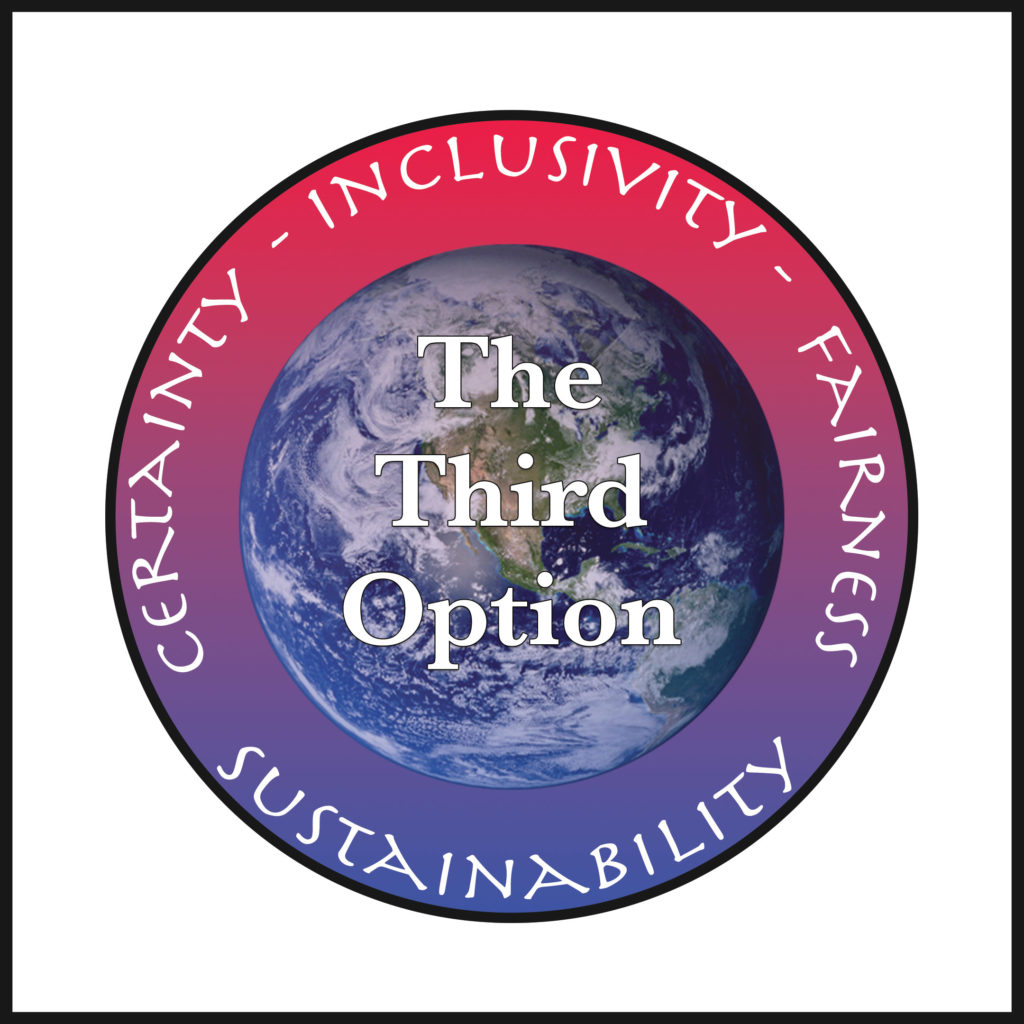
The Third Option completely agrees with Gordon Lafer: all of us, from top to bottom, are the product of the economic structures in which we operate. As corporate America, with the rational self-interest of a virus, continues to weaken the only system (government) capable of fighting it off, no miracle cure is forthcoming. The paradigm of ‘economic self-interest’, no matter how many times we might run the simulation, will always fail to achieve certainty, fairness, inclusivity, or sustainability for all people. Until we decide together to alter our economic structures to include the entire person, only the greedy, selfish, addictive, oppressive, controlling, and fearful parts of ourselves will be rewarded.
The Third Option is not afraid to play economic chess versus Capitalist ‘checkers’, and tweak our current structures so they produce healthy outcomes for people and planet. One move would be to establish Universal Healthcare so government could tax tobacco, in order to cover the cost of the health care these smokers would eventually need, meanwhile offering ‘proactive health care’ as well (meaning that we would try to help these people be healthy, rather than profit from their eventual unhealthiness). This plan is certainly rational as well: it allows the tobacco company to retain their self-interest, meanwhile people retain their freedom of choice; even humanists get their chance to sincerely help people, by supplying ‘accountable’ health care with proactive health options attached (including mental health).
The Third Option also advocates for a 10% tax across the board, for income, inheritance, capital gains, et al. Unfortunately for corporations, this represents a 10% tax on ‘gross’ revenue, meaning all gains prior to deductions being taken. The only two deductions allowed would be payroll – money given to workers (which would be taxed per their income) plus any interest payment on National Public Bank loans they might utilize for their businesses. With all income tax going into (and loans going back out of) a National Public Bank, we in essence tie all our fates together, which allows everyone to prosper from each citizen’s pursuit of their rational self-interest. This National Public Bank would not only yield ‘retirement dividends’, from the collective interest earned through loans funding community infrastructure projects, but would also create a ‘living wage’ for all workers, by lowering the cost of all the essential needs created through this upgraded community infrastructure – two benefits Gordon Lafer is passionate to help secure for American workers.
The Third Option understands that economists are also forced to act rationally. Science, by its very mission statement, is about observing what is already there, and through the unwavering truth of mathematics, capture the occurring phenomenon. The problem is that economics is not a science. It is a management tool, utilizing the science of people and planet to build an economic infrastructure, similar to how engineering builds physical infrastructure based on physical science. We do not need economics to describe the water in which we are currently drowning, we need it to build us some kind of flotation device. Even better, build us bridges (between people and planet), boats (to survive the rising tide of economic growth), reservoirs (to pool our resources together, and dams (to stop the flood of inequality from drowning the whole world). For more on this subject, read our plea to economists to help form a third option for American Capitalism – one based on their recommendations, their support, and their political will – in order to upgrade our 300-year old operating system to fit a 21st century world.
Other Works By Gordon Lafer
Books:
Articles:
- “Right to work”
- “Jim DeMint’s race to the bottom”
- “Do Poor Kids Deserve Lower-Quality Education Than Rich Kids?”
- “Costly Failure: California is Overpaying for Online Charter Schools That Are Failing Students”
Interviews:
Videos:
Social Media:
- LinkedIn: Gordon Lafer
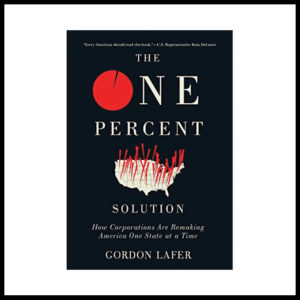
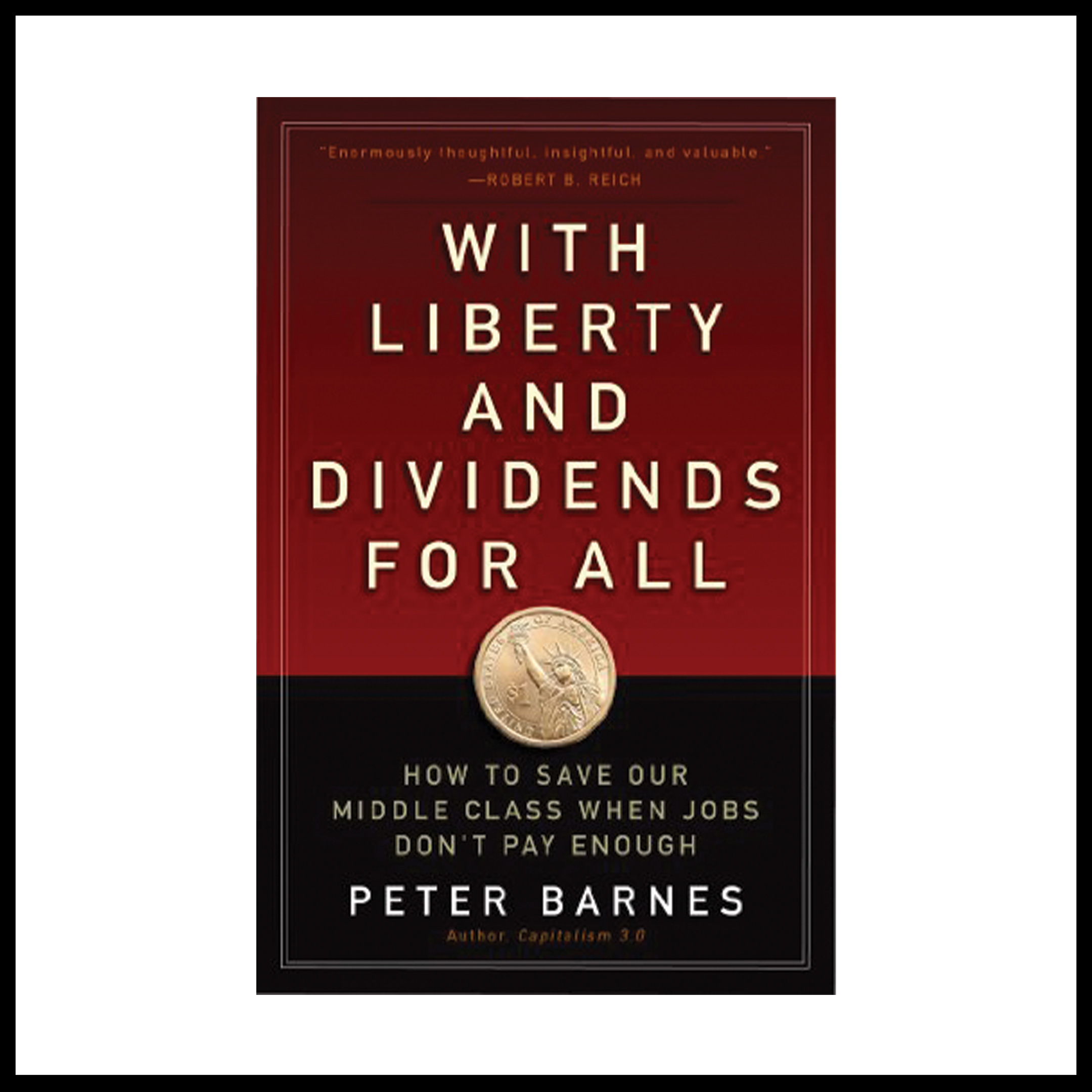 With Liberty and Dividends For All by Peter Barnes – a Book Review
With Liberty and Dividends For All by Peter Barnes – a Book Review